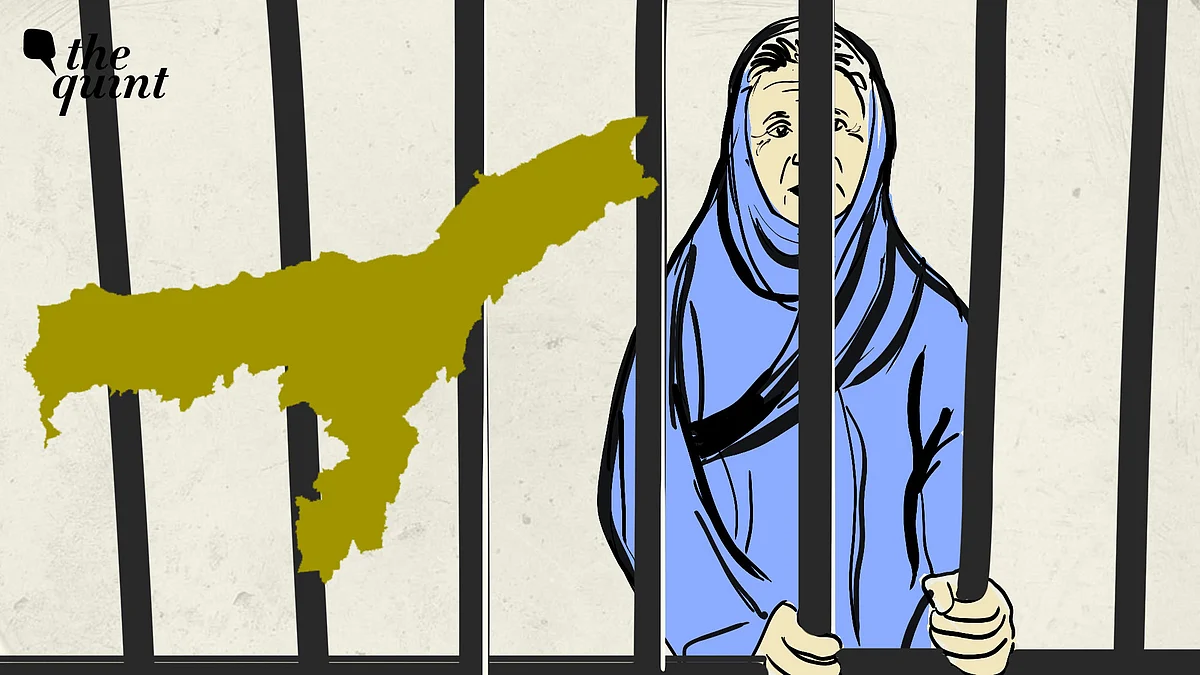
SC Directs Release of Woman, Branded as 'Foreigner', From Assam Detention Centre
Anowara Khatun was unable to afford a lawyer to fight her case. Result: She's in the detention centre for 1.5 years.

advertisement
Investigative stories like these not only require resources but also editorial independence, which comes at a great cost. If you want our newsroom to be free from the pressure of those in power, consider supporting our work. From ground-breaking investigations to asking tough questions, The Quint has been relentless in its political coverage. Join us in asking the tough questions — BECOME A MEMBER today.
Sixty-three-year old Anowara Khatun from Bhakuamari village, Barpeta district in Assam was declared to be a foreigner/illegal immigrant by the Foreigner's Tribunal. Khatoon had been confined to a detention centre for the past one year and five months.
Previously, the Guwahati High Court had dismissed the petition filed in her case, thereby, confirming the FT's order.
Since foreigner tribunals work on a reverse burden of proof (meaning that the person accused of being a foreigner has the burden to prove they are an Indian citizen), she was declared an illegal immigrant and was confined to the Transit Camp, Matia for 1.5 years.
The Quint accessed the court's interim order as well as the petition filed in Khatun's case. Senior advocate Kapil Sibal and AOR Talha Abdul Rahman's team were Khatun's lawyers.
The court in its order observed, "Prima facie, it appears on plain reading of the judgment that for some reason or the other, the appellant was not able to appear before the Foreigner's Tribunal and make good her case that she is not a foreigner but arrived in India within the time period stipulated under Section 6 (A) of the Citizenship (Amendment) Act, 1955."
In her case, Judges JB Pardiwala and R Mahadevan stated that when an individual is declared a foreigner and sent to the detention centre, authorities have to deport that person within a span of two years.
Failing to do so, would mean the person can be released subject to terms and conditions.
Documents to Prove Citizenship in Place And Yet...
But here's what we know about Khatun's case.
Khatun's family has been residing in Assam since before the independence. The names of her grandfather and father appear in the 1951 NRC list, her own name is recorded in 2018 NRC list as well.
Moreover, the petition filed in her case also shows that her family and her own name have been recorded in the voter lists over the years and that she also possessed land documents.
Coming from a poor socio-economic background, Khatun is not literate or educated. She is dependent on the earnings from her son's livelihood i.e. selling dry fish.
Due to her family's illiteracy, they struggled to grasp the significance of the notice sent to them and did not have the financial means to immediately engage a private lawyer to fight her case.
Her family had to shift twice to different villages, the second time from Bilasipara to Matanga due to floods and to earn livelihood in 1980.
The petition had stated, "The petitioner has documentary evidence to show she is an ordinarily resident of Assam before 25th March 1971 but could not avail of any forum to show the same."
This case comes in the wake of Supreme Court pulling up Assam government for keeping persons declared foreigners in detention centres indefinitely and not deporting them.
The Centre informed the Supreme court on 25 February that the issue of deportation of persons declared foreigners in Assam was under consideration at the "highest executive level."
Prior to this, however, On 4 February, a Bench of Justices AS Oka and Ujjal Bhuyan came down at the state for people indefinitely detaining people declared as foreigners.
“..Are you waiting for some muhurat [auspicious time]? Once you declare a person as a foreigner, then you have to take the next logical step. You cannot detain them for eternity. Article 21 of the Constitution is there..' the Bench asked the counsel appearing for Assam.
Earlier in January this year, the Supreme Court also had also slammed the Assam government for not giving its reasons in reply for detaining 270 foreigners at the Matia transit camp.
- Access to all paywalled content on site
- Ad-free experience across The Quint
- Early previews of our Special Projects
Published: undefined